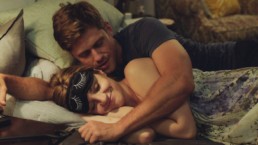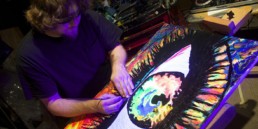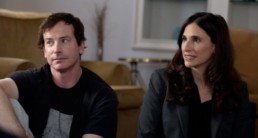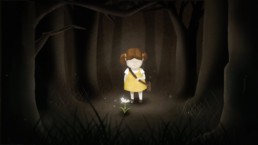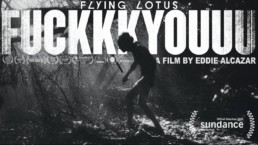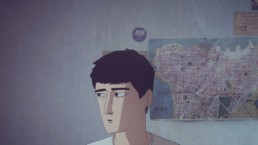'Stereotypically You' Offers a Twist on the Traditional Rom-Com
Broadway star Aaron Tveit aka "Danny Zuko" recently premiered his latest indie film Stereotypically You at the Santa Barbara International Film Festival. While romantic comedies tend to skew toward the portrayal of relationship struggles of New York City dwelling, twenty-something women who are unlucky in love, Stereotypically You does offer this time-proven formula, but with a twist. Our protagonist Charlie Carroll (Tveit) is a handsomely charming man who seems unable to find love for one reason or another (more on that later) and follows his journey of ups and downs as a single man in the dating jungle that is NYC.
Tveit, who was most recently seen playing Danny Zuko on the FOX musical Grease: Live, is out of sorts after quitting his job and breaking up with his girlfriend Angela (Abby Elliot). Deeming himself unlovable, his surreal experiences, hallucinations, and flashbacks all center around Angela, as he struggles unsuccessfully to get her off of his mind. His pathetic attempts at speed dating prove a waste of time, but it finally seems as if his luck will turn around in the most unlikely of places.
First off, one has to wonder just why Charlie is single, he's so handsome and from the picture we've been painted, he's a really sweet guy. One flashback shows an adolescent-aged Charlie bumming over a rejection note from the girl he liked, while his friend plays video games. The question of why was he unlikable as a pre-teen, however, is not clear- so just what is Charlie Carroll's problem? The audience is never given the opportunity to understand why his relationships fail, it's like the job interview question, "What's your biggest flaw?" and the response is "I care too much." It just doesn't quite make sense.
Aside from this weak character development, what I found most underwhelming in Stereotypically You, was that the story didn't feel full or complete, despite strong performances from Tveit, Elliot, Lauren Miller, and Kelen Coleman. One of the most noticeable examples was the lack of score and background music in most scenes. Music could have aided in the film's fluidity by giving subtextual clues as to what our characters are feeling or thinking, but instead, the lack of sound draws attention to every quiet, awkward moment on screen.
What lacks in originality is compensated for in creativity, with many scenes feeling like zany or outrageous SNL skits. Writer/director Benjamin Cox does create authentically funny moments, like when Charlie's therapist "breaks up" with him, claiming "It's not you, it's me" and that he "Needs to see other people." The divorce party for Charlie's friend is another amusing scene, although overall, Stereotypically You seems to just fall a bit short of what it has set out to achieve. That said, I'm sure most viewers would agree that this lighthearted approach to being single in the big city will still make for a casually enjoyable watch.
'John' Highlights a Successful Painter Who Creates Without Sight
The short documentary simply titled John opens with John Bramblitt reciting a quote from Hemingway about the process of creating. Bramblitt's work studio is covered in different colored paint pallets and canvases both new and used. From the outside, this looks like an ordinary day in the life of a successful painter, and it is- to a certain extent. John is a successful painter, and he is blind.
What is shocking from the very beginning of the film is just how detailed and accurate John's paintings are, despite his condition. Throughout the film, he explains just how he became in tune with his other senses, especially garnering a heightened sensitivity to touch, and how for him, the fulfillment isn't about the artwork, but rather, the process. After an online Reddit post shot him into the spotlight, orders for personalized artwork came flooding in. John speaks with a softness that draws the viewer in, and keeps them there with his profound thoughts on life, like "if it wasn't for the dark you wouldn't notice the light." There are so many quotable moments in the film's 30 minutes, it almost feels like this film doubles as poetry.
'John' Trailer from Satellite Pictures on Vimeo.
John Bramblitt wants to change the way blind people approach art, and that's made very clear throughout the film. At times, it seems as if his message is a little over-repetitive; John is essentially a tribute to an artist director Lara Firestone finds inspiring and wants everyone else to agree to as well. However, it is never a dull moment watching him create magic surrounded by his wife and son. John says in the film that to him energy is color, and watching him onscreen, I'd say John is a fluorescent rainbow.
Michael Keaton & Rachel McAdams Talk 'Spotlight' at Santa Barbara Film Festival
Morgan chatted with Michael Keaton and Rachel McAdams (Mark Ruffalo said 'hey' via satellite) as they celebrated their American Riviera Award for their performances in Spotlight at the Santa Barbara International Film Festival.
The Snuggle is Real, in 'Cuddle Party'
The short film Cuddle Party has made the rounds throughout the festival circuit and screened last night at SBIFF. Recognizable faces drew audiences into the theater, and the tagline "The Snuggle is Real" seemed like a setup to the perfect 15-minute comedy. Unfortunately, the laughs are few and far between, and what we are left with at the end of the film's short runtime is a deflated sense of what could have been.
Kate Winslet Lends Her Voice to the Animated Anti-Bullying Short 'Daisy Chain'
Narrated by Academy Award-winning actress Kate Winslet, the animated short film Daisy Chain tells the sweet tale of Buttercup Bree, a little girl who, with the help of her friend Benjamin Brewster, stands up to playground bullies through the simple act of sharing. Written and directed by Galvin Scott Davis, the film screened at the Santa Barbara International Film Festival and was met with strong applause for its anti-bullying subject matter and uplifting message.
Daisy Chain - Animated Film narrated by Kate Winslet
Oscar-Nominated 'A War' Examines Morality of Combat in War
One of the Oscar nominees for Best Foreign Language Film at this year’s Academy Awards comes from Denmark, and with a delicate sensitivity and commanding presence, A War tells the story of one soldier’s dealings with the repercussions of a life-changing, split second decision and its effects on the people he loves and supports. It is an unglamorous, yet extremely truthful, look at everyday life during wartime and how some of the toughest battles begin after the fighting has ceased.
Setting up the first scene with extreme intensity, a young soldier’s legs blown off by an IED during a routine outing near their base in an Afghan province. Blood is everywhere, body parts lay amongst the desert sand, and company commander Claus M. Pedersen (Pilou Asbæk) is informed shortly after that the man has bled out and died. A young man himself, Pedersen is deeply affected by the loss but as the leader, he shoulders the emotional outcry from his fellow soldiers. Behind the tough exterior is a sensitive soul who just wants to make it back home to his family.
Meanwhile, back in Denmark, Pedersen’s wife Maria (Tuva Novotny) struggles to take care of their three young children alone. The middle son acts out at school, a direct result of not having his dad around, and she relies heavily on her eldest daughter to help out with the toddler. Balancing both the maternal and paternal roles have Maria exhausted and her patience wearing thin; the sporadic phone calls from her husband are the only things keeping her going.
Claus and Maria are both looking forward to his return home, which is only weeks away when a routine safety patrol of the local Afghani civilians turns into an unexpected crossfire, which forces Claus to make a difficult decision that results in unimaginable consequences for both his family on the battleground and his family back home.
Director Tobias Lindholm brings the intensity both physically and emotionally in A War with the parallel dramas unfolding in Claus’ and Maria’s lives. They are both fighting for their own respective happiness and jointly feel life’s devastations when things are thrown into despair. The question becomes “What justifies something as being ‘the right thing’ or ‘politically correct’ when your life or the lives of the people you love is at risk?” Lindholm takes A War to philosophical depths that asks the audience to actively participate in the viewing experience by pondering the same existential thoughts as the protagonists.
While most films in this genre tend to overdramatize the action, “Hollywood-izing” the experience, A War does no such glorifying. Instead, what we have here is a harrowing and realistic account of what I can only imagine to be heightened tension during battle. In both a very literal and abstract sense, A War represents the universality of the human condition when put under extreme pressure and the lengths one is willing to go to in times of despair. A War is rated R for language and some war-related images and is in Danish with English subtitles.
Eddie Alcazar Talks Flying Lotus and 'FUCKKKYOUUU'
One of the buzziest films to screen during the festival circuit thus far (see: Sundance Film Festival, NEXT Fest) is a short film collaboration between director Eddie Alcazar and Grammy-nominated Flying Lotus. Unabashedly bold, FUCKKKYOUUU revels in elements of Grindhouse horror and experimental absurdity, not following the traditional "beginning, middle, and end" narrative formula we've come to expect, but instead takes the viewer on a mindbending visual trip. Alcazar, whose other films include 2014's Tapia and the upcoming features Johnny and 0000, caught up with us after the Sundance premiere where he talked about his creative process and shared his pre-production storyboard drawings. We begin:
It's been said that artists are ultimately driven by a need to be understood, on some level. With a film like this, to what degree is your message trying to be "understood"?
I believe that expression is most important. To be able to have a medium to explore and release visions and emotions like in film is a true gift. I also like the idea that multiple people will have different interpretations and I feel that the reactions that spark from projects are all very interesting. With FUCKKKYOUUU to be clear with narrative wasn't the intention, it was more focused on exploring a new way to communicate with just visuals and music. It made me analyze my dreams and how we accept our dreams how they are, they are part of being human and a lot of times they don't make much sense but we still feel them as we experience them, they don’t need to have a standard beginning, middle or end to make you think and strike emotion.
FUCKKKYOUUU is so strong and precise in its dark, old school horror aesthetic. Did you have a visual style or certain imagery in mind preceding the collaboration with Flying Lotus that you were looking to reproduce onto film? Or was the story the original thing you thought of first?
The original idea came to me very quickly after I heard some of Flylo’s music. I have been wanting to shoot on black and white reversal for some time so that also fit well with the idea. I knew without a doubt that I wanted that first vision I had to be in the film so we shot it right away. Then I was able to take some time away, edit and review that footage. It ending up inspiring more scenes which we shot later and then merged together to complete the film.
As a director, what does your inspiration/ mood board look like?
I created an actual book for this film. It's pretty lengthy and everything was storyboarded in pretty strong detail. Maybe one day we will release it...


What have people asked you about the most after seeing the film?
How I came up with such a crazy idea.
What’s the biggest risk you’ve taken that you feel has paid off?
I think all risks pay off, sometimes they pay off in one area of your life but leave another part fragile and so you tend to focus on the negative instead of how beautiful it is to have the freedom to take the risk at all. It's a rare thing for me to be truly fulfilled when creating. It's a constant roller coaster when you try and venture into new territory, so you just have to keep busy and create more. I'm grateful that this film was able to be seen by a wide audience with the help of Sundance and other festivals and then Vevo and Vimeo. So, in that sense, it has paid off. But I feel there should definitely be more outlets and financing for short films so they can make money and, in turn, be able to create more films.
What do you have planned for 2016?
A feature about the multiverse.
Flying Lotus - FUCKKKYOUUU (a short film by Eddie Alcazar) from Eddie Alcazar on Vimeo.
Animated 'Waves '98' Shows The Continuous Loop of Depression
Written and directed by Ely Dagher, Waves '98 is making a big splash on the festival circuit. This animated film, which won the short film Palme D'Or at last year's Cannes Film Festival, tells the story of one teenager's decision to take charge of and uproot his life after years of living in a continuous loop of depression and monotony in post-war Beirut.
Like a hellish Groundhog's Day, Omar wakes up to his parent's financial stress, depressing newscasts, and isolation daily. A Kate Moss x Supreme poster hangs on his bedroom wall next to a map of Beirut, a clear indication that he has bigger and better plans for his future. He passes the time staring at the city skyline, until one afternoon he witnesses a beam of light in the city center. Intrigued, he leaves the life as he knew it and, without looking back, sets out to find the source of the light and discover what else the world has in store for him.
WAVES'98 Trailer from Beaverandbeaver on Vimeo.
Running just shy of 15 minutes, Waves '98 is not a typical animated film; the majority of the story is illustrated with hand drawn sketches, but most of the landscapes are actual shots of a Beirut Cityscape. When Omar watches the news on TV, the reporter is not animated, rather, she is a grainy, but real, woman reporting the news from the 90s. This combination of mediums creates an undeniable sense wonderment for the viewer and is a fantastic example of the beauty of video art.
Very little dialogue is spoken in Waves '98, but the melodic journey is so distinct that one could follow along with the story even with closed eyes. The film feels very personal to director Ely Dagher, one has to assume this was a cathartic release for him to express his love/hate relationship with specific personal attachments. For those looking for a mysterious, darkly haunting, but etherial film, Waves '98 is an inspirational watch.
Waves '98 is playing in the Animation Spotlight category and is screening 1/30 at the Holiday Village Cinema 1 at 8:30 pm. For more information, click here.

